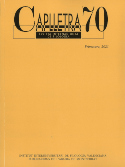Zweig and the daemon. Presences and absences of the reception of a european figure in Catalonia
DOI:
https://doi.org/10.7203/caplletra.70.20002Keywords:
New Humanism, comparative literature, literary criticism, Stefan Zweig, Salvador Dalí, Josep Pla Abstract
Abstract
For decades, the figure and works of the Austrian writer Stefan Zweig (Vienna, 1881-Petrópolis, Brazil, 1942) enjoyed the benefit of unparalleled popularity in Catalonia. Beyond praise and criticism, Zweig, who is arguably one of the most famous writers of the twentieth century, interested and involved writers, artists, critics, translators, politicians, and all sorts of cultural agents in a critique reception of his work in Catalonia which is still to be studied exhaustively and to be interpreted properly.
This article proposes a first interpretation of Zweig’s critical reception in Barcelona, which, however anecdotal, episodic and tangential, necessarily reflects the same contradictions and fluctuations of the author’s global reception. From the analysis of his first translations, the relationship with Salvador Dalí, the meeting with Eugeni d’Ors or Joan Estelrich, the repercussions in the press of his death or the debates that his work provoked between idealists and skeptics, some episodes are analyzed that point out major lines of interpretation of Zweig’s work and thought.
 Downloads
Downloads
Downloads
Published
How to Cite
-
Abstract360
-
PDF (Català)301
Issue
Section
License
Authors submitting work to Caplletra for publication must be the legitimate holder of the usage rights. Legitimacy for the purposes of publishing the work must also include images, tables, diagrams and any other materials that may complement the text, whether they are the author of such material or not.
Copyright: on publishing their work in the journal, the author grants Caplletra. Revista Internacional de Filologia usage rights (reproduction, distribution and public communication) for both the paper printed version and for the electronic version.
All work published in Caplletra is covered by the Creative Commons license type Attribution-NonCommercial-NoDerivatives 4.0 (CC BY-NC-ND 4.0).
RESPONSABILITY
Caplletra. Revista Internacional de Filologia does not necessarily identify with the points of view expressed in the papers it publishes.
Caplletra. Revista Internacional de Filologia accepts no responsibility whatsoever for any eventual infringement of intellectual property rights on the part of authors.






